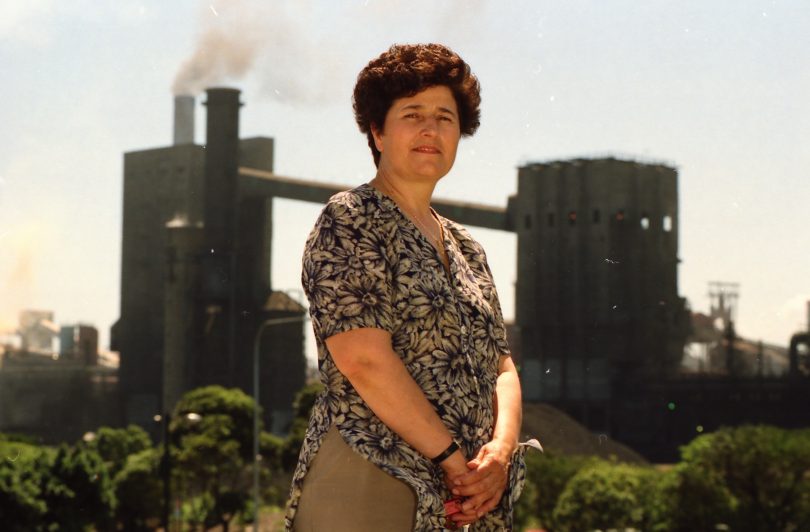
An image from Women of Steel shows Roza Klujaricek, Slobodanka Joncevska and Fotini Voulgaris leaving work at Port Kembla steelworks. Photo: Supplied.
Nelligen filmmaker Robynne Murphy still kicks herself for not taking her camera to the streets of Wollongong between 1980 and 1994, when she was front and centre of a campaign by women for jobs in the BHP-AIS steelworks in Port Kembla.
Instead, she had to spend months trawling through archives of newsreels and images for her documentary, Women of Steel, which has been recognised by the History Council of NSW for capturing Australia’s largest anti-discrimination case and an important milestone in the women’s liberation movement.
Women of Steel is also a finalist in the prestigious $10,000 Documentary Australia Foundation Award for Best Australian Documentary at the Sydney Film Festival, and in the Best Documentary – History and Best Documentary – Social and Political Issues categories of the 2020 ATOM (Australian Teachers of Media) Awards.

Women of Steel director Robynne Murphy working in the steelworks. Photo: Supplied.
The documentary portrays an important and now sometimes forgotten episode in Australia’s history, and Robynne left a promising career as a young filmmaker – she was selected for Australian Film Television and Radio School’s very first intake – when she became caught up in the Jobs for Women campaign.
At the time, BHP was the biggest, most powerful company in Australia – employing around 20,000 people – and working-class and migrant women wanted to work at the steelworks to make a better future for themselves and their children. However, they were told there were no jobs.
The documentary follows the hundreds of women, including Robynne, who had no work, no income and filed an anti-discrimnation class action against BHP.
They wouldn’t take no for an answer and even marched on Canberra, breaking down the doors at Parliament House.
Robynne said the women thought of every argument that could be used against them to show why they couldn’t work at the steelworks and came up with a better argument for why they could. They even printed their campaign messages in six different languages to ensure they captured Wollongong’s multicultural community.
After the success of the campaign, Robynne and other women were finally offered work at the Port Kembla steelworks. Robynne worked there for 30 years as a welder, crane driver and hot strip mill operator.
Since retiring to Nelligen, the 70-year-old says she has found the time to tell the story she hopes will inspire others to continue to fight against “Australia’s sexist culture”.

In the Women of Steel documentary, Mara Goluza talks about how it felt to beat BHP. Photo: Supplied.
Robynne plans to help other grassroots campaigns once the documentary is released on Wednesday, 18 November, at the ACTU Activist Conference.
“A lot of changes happened after our campaign,” she says. “There are a lot of women now working in what were seen as blokes’ jobs 40 years ago, but I don’t think many women realise that it took struggle to make those changes.
“I also think we still live in a very sexist society – women are the ones working part-time, casual jobs, if they’re working at all, and look at what’s happening in parliament,” adds Robynne, referring to recent claims of sexism and inappropriate behaviour in parliament towards female political staffers and members.
Women of Steel will preview online on Thursday, 26 November, and at the National Film and Sound Archive in Acton, ACT, on 2 December.
Original Article published by Hannah Sparks on About Regional.












